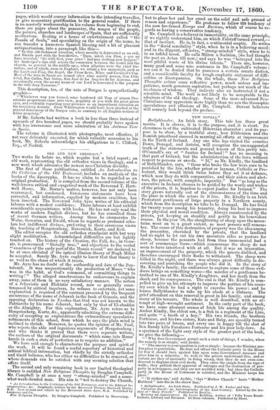OLD AND NEW THEOLOGY. *
Two works lie before us, which require but a brief report; an old work, representing the old orthodox views in theology, and a new work which advocates the newest neo-Christian divinity.
The first of these publications, entitled An Introduction to the criticism of tlw Old Testament, includes an analysis of the books of the Apocrypha. It has no claim to be regarded as an
original production. It is compiled from the second volume of the well-known critical and exegetical work of the Reverend T. Hart- well Horne. Mr. Horne's matter, however, has not only been rearranged, but condensed. Erroneous statements have been corrected, and information, supplied by modern erudition, has been inserted. The Reverend John Ayre writes of his editorial labours with a modest confidence. Those labours at least exhibit considerable acquaintance with books. He has not only read the works of modern English divines, but he has consulted those of recent German writers. Among these he enumerates De Welse, Gesenius, and Ewald, whom he regards as profound scho- lars but indifferent divines, preferring to their erroneous views the teaching of Hengstenberg, Haverniek, Kurtz, and Keil.
The editor occupies the old orthodox standpoint with but very slight modification. Acknowledged difficulties are but lightly touched on. The history of the Creation, the Fall, &c., in Gene- sis, is pronounced "literally true," and objections to the verbal "exactness of the early part:of the Mosaic record" are declared to
be at once obviated if the optical illusion theory of Hugh Miller be accepted. Surely Mr. Ayre ought to know that that theory is as void as the chaos of which it treats.
Mr. Ayre has no doubt of the authorship and date of the Pen- tateuch. It was unquestionably the production of Moses "*ho was in the habit, at God's command, of committing things to writing!" The alleged anachronisms he endeavours to explain away, some of them in no very satisfactory manner. The notion of a Jehovistic and Elohistic record, now so generally coun- tenanced by critical inquirers, he refuses to entertain, yet some explanation is required of the contrast presented by the frequent occurrence of the name of Jehovah lathe book of Genesis, and the
opposing declaration in Exodus that God was not known to the Patriarchs by his name Jehovah, but only by that of El-shaddai
or the Almighty. For this explanation, Mr. Ayre refers us to
Hengstenberg, *Kurtz, &c. apparently admitting the extreme diffi- culty of accepting as explanations the extraordinary speculative
refinements of this school, from which he says the plain mind is inclined to shrink. Moreover, he quotes the opinion of Mr. Paul, who rejects the able and ingenious arguments of Hengstenberg ;
and who thinks itproved that there were separate writers, the authors of the original documents " which came into Moses' hands in such a state of perfection as to require no addition."
• We have said enough to characterize the purpose and spirit of the work. It will be found a useful repertory of historical and critical biblical information, but chiefly by the strictly orthodox and timid believer, who has either no difficulties to be removed, or whose'dernands can be satisfied with any seeming solution that offers itself.
The sebond and only remaining book in our limited theological library is entitled New Religious Thoughts by Douglas Campbell. Mr. Campbell is at once a very "strong-minded" and a some- what weak-headed man. His aim is "not to destroy the Church, • An Introduction to the Criticism of the Old Testament, and to the Biblical In- terpretation; Ike. Originally written by the Hmerend Thomas Hartnett Horne, B.D. Now revised and edited by the .Reverend John Ayre, M.A. Published by Longman and Co.
New Religious Thoughts. By Douglas Campbell. Published by Manwaring.
but to place her and her creed on the solid and safe ground of reason and experience." He professes to follow tlit tendency of the now far-famed Essays and Reviews, which- of course he re- gards as having a conservative tendency. Mr. Campbell is a believer in immortality', on the same principle, if we rightly understand him, on which Falstaff turned coward,— that of instinct. He is, in fact, a sentimental sceptic. He writes in the "florid sensibility" style, when he is in a believing mood; and in the flippant, offensive, "strong-minded" style, when he is in an infidel mood. He calls Milton a Soeinian, (we had thought the poet an Arian till now,) and says he was "betrayed into the most pitiful waste of his divine talents." There are, however, many good and some wise sentences in Mr. Campbell's volume ; nor can it he denied that he possesses a certain ornate diction, and a considerable faculty for rough emphatic statement of diffi- culties or discrepancies. On the whole, these New Religious Thoughts evince some reflective power, much ardour and im- patience, much generous aspiration, but perhaps not much of the meekness of wisdom. They indicate also an instructed if not a scientific mind. The work is not likely to be acceptable to the admirers of the old theology. Some of the more advanced Neo- Christians may appreciate more highly than we can the theosophic speculations and effusions of Mr. Campbell. Devout believers will scarcely look beyond the preface.


























 Previous page
Previous page